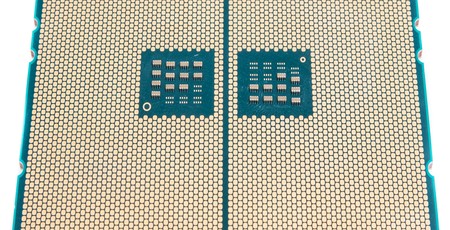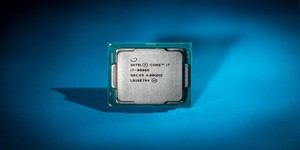If anyone thought that CPUs weren't the current hot topic in PC hardware, the last week will likely have persuaded them otherwise. Intel began by announcing its first CPU capable of boosting to 5GHz out of the box, the Core i7-8086K, but the fact that it will retail for considerably more than the Core i7-8700K while only offering slightly higher clock speeds and perhaps more overclocking headroom means that it won't be particularly great value. It's not designed to be, but even so.
Intel's next announcement, though, was arguably a bigger milestone, at least on the face of it: a 28-core, 56-thread high-end desktop CPU. While most signs point to this "simply" being a port of an existing Xeon Skylake CPU that was rushed to announcement in order to steal some thunder from AMD, the fact remains that the core war is showing no signs of slowing this year, as the flagship Intel HEDT CPU core count is rising by 10 cores this year compared to eight last year, when we moved from the Core i7-6950X to the Core i9-7980XE.
The HEDT core count crown did not stay on the head of Intel for long, though, as the very next day AMD announced that its flagship 2nd Gen Threadripper will be unlocking those two dummy dies and unleashing another 16 cores, raising the core count from 16 to 32 and bringing the total thread count to a staggering 64. Getting your head around what this means and trying to figure out who might win is tricky, as there are so many factors at play, but it's fun to do anyway.
The first thing to do is look at what happened last time round. If you take a look at our Core i9-7980XE review, there were two essential points to take away from its battle with Threadripper. Yes, the Intel CPU was hugely expensive, but it was more overclockable and very often quicker at stock speed than an overclocked Threadripper 1950X. The latter was much cheaper, but you have to remember that the kind of people buying these CPUs want the fastest gear they can afford, because time is money, so if they can shave 20 minutes off rendering time, it's often well worth the case, and it's a very different scenario to buying a CPU for your typical £1,000 gaming PC.
Intel's CPUs are also monolithic as opposed to a pair or quartet of dies sandwiched together as with Threadripper. There are pros and cons with both methods, of course, but Threadripper's need for various memory access modes and the sometimes significant differences between them in terms of performance mean that while it's a cheaper and easier way to create a high core count CPU, Intel's monolithic approach does mean that it's fast all the time, whereas with Threadripper you'll see much better performance in games by using its non-uniform memory access mode that reduces latencies. Thankfully, our testing showed that while this mode means that memory isn't distributed across all available memory channels, high-load multi-threaded tasks didn't see much of an impact.

If anything, the most important trump card at this end of the spectrum is to have the most powerful CPU. If potential owners have a budget, then there will be CPUs here that fit it, such as the Core i9-7900X or Threadripper 1920X. Those with fat wallets and a lust for the fastest, bragging-rights hardware aside, the rest will, as I say, be looking for the CPU that will churn through their rendering loads in the least time. Last year, Intel snuck in with its 18-core Core i7-7980XE that was not only the most powerful but also had the highest core count, with the latter point there probably annoying AMD, which had barely a few weeks with the highest core count desktop CPU.
This time round, things have reversed. It looks like AMD has the new record in the bag with 32 cores and Intel a "paltry" 28. However, there's a massive gaping hole in our understanding of just how fast these two CPUs will be, and that is clock speed. AMD has stated that something in the region of 4GHz will be the target for the 32-core Threadripper, and we can also look forward to the same lower latencies and better boosting algorithms that we saw introduced with 2nd Gen Ryzen, so there's hopefully more going on here beyond a pure core count increase.
Then we have Intel. The Internet is awash with claims of foul play and a misleading presentation that clearly showed its 28-core CPU running at 5GHz across all cores. It turns out that that CPU was both under extreme cooling and overclocked, neither of which were made clear at the time. However, this doesn't mean we can write off the CPU entirely. For starters, you only have to look at our own review of the Core i9-7980XE to see how many people were surprised to see it could overclock to 4.5GHz on all cores and offered such a big leap hear compared to the Core i7-6950X, which is made using the same 14nm manufacturing process. Of course, Skylake-X did bring a 14nm refresh as well as tweaked cache design, but Intel seems to be in the habit of allowing fairly high overclocks on its high core count CPUs recently.
Who knows what's actually under the hood of this CPU? Regardless, while 5GHz without extreme cooling is very unlikely, the fact that the Core i9-7980XE overclocked to within 100MHz of the Core i9-7900X - a CPU with eight fewer cores - means that overclocks well in excess of 4GHz might be possible with this 28-core CPU. This will clearly be a challenge for all but the biggest air- and liquid-coolers; even at 4GHz and 1.1V our Core i9-7980XE is too much for most coolers we've tried recently, but the same will apply to a 32-core Threadripper. The key point here is that Intel looks likely to have a four-core deficit against the flagship desktop Threadripper, but that gap could be overcome if it can manage a decent overclock, and it could also be quicker in lightly-threaded applications (though their relevance to those who want around 30 cores is surely minimal). I'm not forgiving Intel for its 5GHz antics here, but all I care about is seeing who wins the ultimate desktop CPU crown in 2018, and that's all we should be concerned with.

MSI MPG Velox 100R Chassis Review
October 14 2021 | 15:04








Want to comment? Please log in.